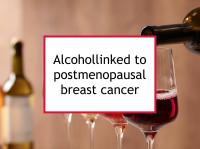Alcohol consumption is one of the most well-established risk factors for breast cancer. The increased risk conferred by drinking can begin as early as the teenage years. The risk increases in proportion to the amount of alcohol consumed, more so for binge drinking. Now a major new study has reported that even light drinking is associated with increased risk of postmenopausal breast cancer.
Alcohol and breast cancer
The risk associated with alcohol intake appears to be highest for hormone receptor positive (ER+/PR+) disease and lobular breast cancer. However, alcohol has also been reported to promote HER2-positive (HER2+) breast cancer development via an estrogen signaling pathway and to increase the fraction of stem cell-like cells in triple negative (ER-/PR-/HER2-) breast cancer cell populations.
Women who are fast metabolizers of alcohol (and therefore "can't hold their liquor") have a higher risk of breast cancer from alcohol consumption than slow metabolizers. Having multiple drinks in one day increases breast cancer risk more than having the same number of drinks spaced over a week. Note that the potentially beneficial effects of the resveratrol in red wine does not effectively counteract the cancer-promoting effects of its alcohol content.
Alcohol consumption that takes place before diagnosis has been found to be associated with a modest but significant increase in breast cancer recurrence. Alcohol intake after diagnosis is also associated with increased breast cancer recurrence and death, especially for postmenopausal women, those using hormone replacement therapy (HRT), and overweight or obese women.
Latest research links light drinking to breast cancer
The Norwegian study referenced above was designed to investigate the impact of light-to-moderate alcohol intake, defined as up to 20 g/day (approximately 1.4 five-oz glasses of wine), on the incidence of various cancers among postmenopausal women, including breast cancer. To conduct the study, the authors used data concerning 32,735 postmenopausal women in the Norwegian Women and Health (NOWAC) cohort study. Study participants were followed for an average of 19 years.
Each additional 12g/day of alcohol consumption was found to be associated with a 20% increase in breast cancer risk. The increase in risk was 27% among women who used menopausal hormone therapy (HRT) compared to 12% for those who never used HRT. The authors conclude that women consuming light to moderate levels of alcohol experienced an increased risk of postmenopausal breast cancer. The study results do not support "up to one drink per day" as a safe limit for breast cancer risk, especially for postmenopausal women who use HRT, according to the authors.
